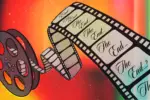When one thinks of a movie, the first aspect to cross someone’s mind is the way it looks: the cinematography. Or maybe even the actors involved. No one is ever curious about the sound department. Why? Sound is only successful when unnoticed. If you remember every single movie’s sound design, you’re either a film fanatic or just plain crazy. Now, if you remember every movie whose music was so loud that you couldn’t hear the dialogue or whose sound effects were just a second off from the action, you’re normal. The beauty of sound in cinema is that no one will ever notice just how great of a job has been done; instead, they will be immersed and living in the world that’s been created.
Even though the sound department’s goal is to be unseen (pun intended), that doesn’t mean what they do is any less important. A great example of this is one I learned from a film class. Pick out a movie and watch the first 15 minutes of it without the sound. Then switch, and for the same 15 minutes only listen to the movie. Not always, but most of the time, you can obtain more context and information about the scene through sound. This isn’t saying visuals aren’t important, but sound connects to visuals more than people are aware.
As well as being an underrated characteristic of the film world, sound is popularly only referred to as music. Spoiler alert: Sound is not just the music. When people hear the word “soundtrack” they automatically think that means the score, although the score is just one-third of it. A film soundtrack also includes all the sound effects, dialogue and human voices.
When it comes to film, what people forget to acknowledge is how essential sound effects (SFX) are to world-building and perspective. This video by Nerdwriter1 demonstrates how the sound team can manipulate the audience to notice specific actions in a movie. The visual might be focused on an object in the foreground, but a sound effect can also draw your attention to a more important object in the background. Nothing is done by accident. Every sound is carefully placed and made with specific intentions.
One of my favorite things to watch is foley artists at work. Watching videos of them creating sound is so interesting because they often use materials you’d never expect. The way they produce certain sounds out of random items to embody an entirely different world is remarkable. It’s like dipping French fries in your milkshake. Or those weird people that like cheese on their apple pies. It seems a little odd, but the end result is phenomenal. Overall, it’s such a fun and impressive aspect of sound. Who knew something as small as effects would need such articulate and meticulous attention?
Another aspect of sound that tends to be overlooked the most is dialogue or human voices. However, it could also be considered one of the most important because of all the context and background information it provides. The audience learns information about people and places through conversations. It’s also crucial for these conversations to be mixed well within the music or environmental sounds. If not, the audience will lose context. For instance, if the mixing of the dialogue audio is too low, you might not have realized that the villain with the creepy breathing mask is actually that one kid’s father. It’s an aspect of sound that’s obviously needed, but the work behind it is much more than just holding a microphone.
Music is what most people are familiar with when thinking about sound in film. In the article “What is the Function of Film Music?” author Robin Hoffman explained, “Music can serve several purposes that are either important on the emotional side of the movie or help/enhance the storytelling.” This is the main characteristic people think about when music is mentioned. While music does create tone and emotional presence, it’s not the only thing it can do to generate atmosphere.
The differences between diegetic and non-diegetic sound can also change the ambiance of a film. Diegetic sound, much like sound effects, can help immerse the audience into the world they are currently in. Diegetic music or source music implies that the film’s characters are also aware of the music. An example of this would be if a character was listening to music in their car or at a party and everyone, from the viewer to other characters in the scene, can hear it. It makes the world more realistic. Non-diegetic sound would be considered the music that only the audience hears. It’s usually the part of the soundtrack that plays underneath the scene — the music that helps to make you cry.
Music is known to create emotional cues, so what happens when we simply get rid of it? This is what occurs in most horror or thriller films. If the sound team desires a feeling of uncertainty or tension for their audience, they’ll take music out altogether. Music is what suggests how you should feel, so if it’s gone, you aren’t sure what’s going to happen. This is such a fun aspect to play around with because again, everything in the sound world is planned out exactly. If there’s an absence of music, you’ll know they are purposely messing with you. The next time you watch a scary movie, think about why you’re so scared. Is it because the loud and terrifying music is warning you something is about to happen? Or is it because there isn’t any at all?
While many people will only ever think of film as a visual experience, audiences shouldn’t underestimate the importance of sound in film and the people that create it. A movie soundtrack is just as complicated to produce as the picture being displayed on the screen. The next time you watch your favorite movie or attend one with friends, keep in mind that if you don’t remember the sound, it’s probably because the team responsible for it did exactly what they intended.

















